CHCECE001: Exploring Cultural Competence and Diversity in Education
VerifiedAdded on 2023/06/16
|22
|6604
|460
Homework Assignment
AI Summary
This assignment solution for CHCECE001 delves into the importance of cultural competence and diversity within early learning environments. It evaluates the impact of family background and environmental conditions on cultural identity, as well as the influence of an educator's background on cross-cultural interactions. The solution identifies key knowledge, attitudes, and skills necessary for cultural competency and provides a comprehensive list of considerations for determining the cultural identities and needs of children and families. It emphasizes the significance of regularly reviewing curriculum and critically analyzing relationships, highlighting qualities of a culturally competent person. Furthermore, the assignment addresses the impact of colonization and historical issues on Aboriginal and Torres Strait Islander people, offering ways to provide culturally appropriate services and consult with local cultural groups. Activities to encourage participation from diverse cultural groups, handling information sensitively, and fostering positive attitudes towards inclusion are discussed, along with building on diverse backgrounds and promoting appreciation of diversity. The solution underscores the importance of secure, respectful relationships and provides insights into supporting children's sense of identity, wellbeing, and connection to their world. Finally, it touches on the National Quality Framework (NQF) and National Quality Standards (NQS) and ways to improve knowledge of cultural competence.
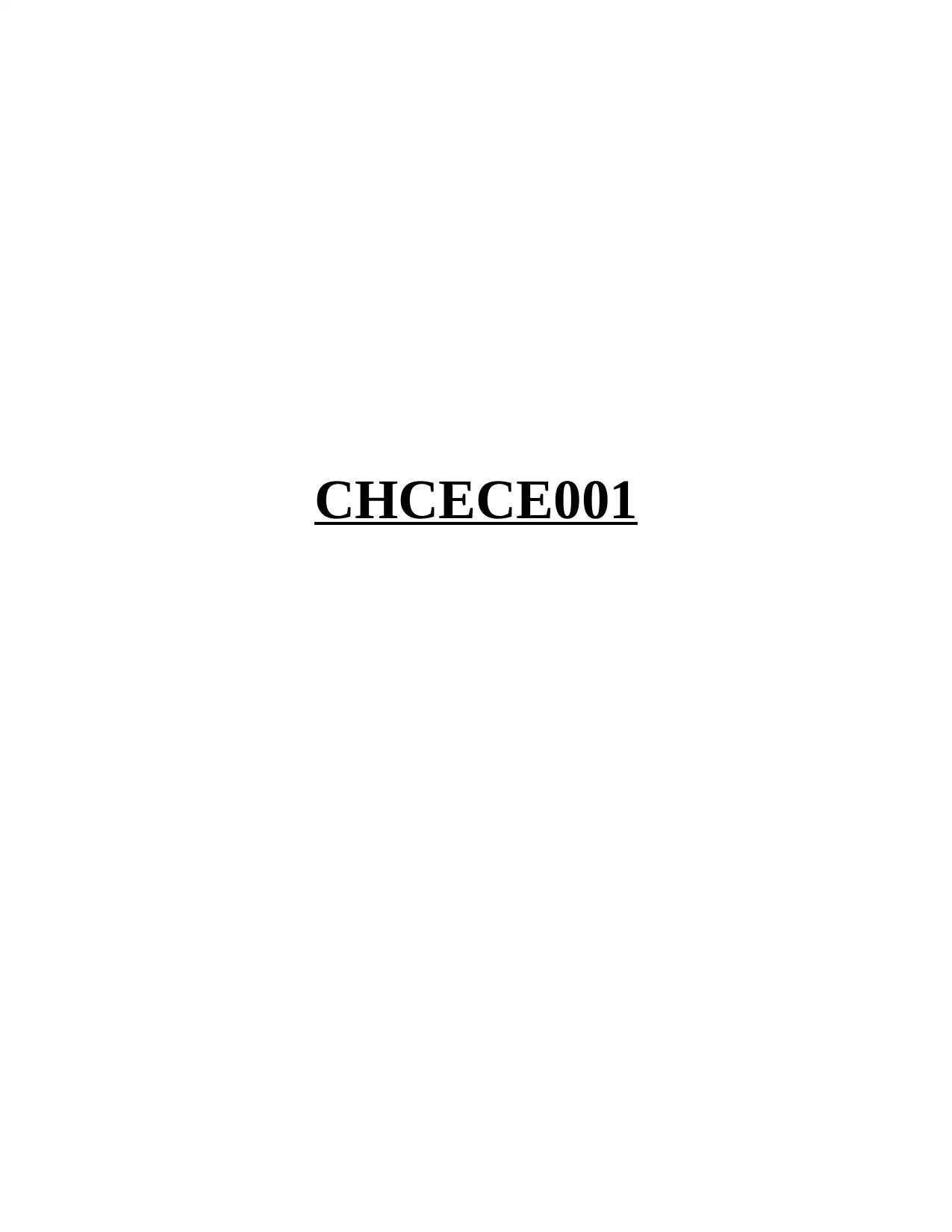
CHCECE001
Paraphrase This Document
Need a fresh take? Get an instant paraphrase of this document with our AI Paraphraser
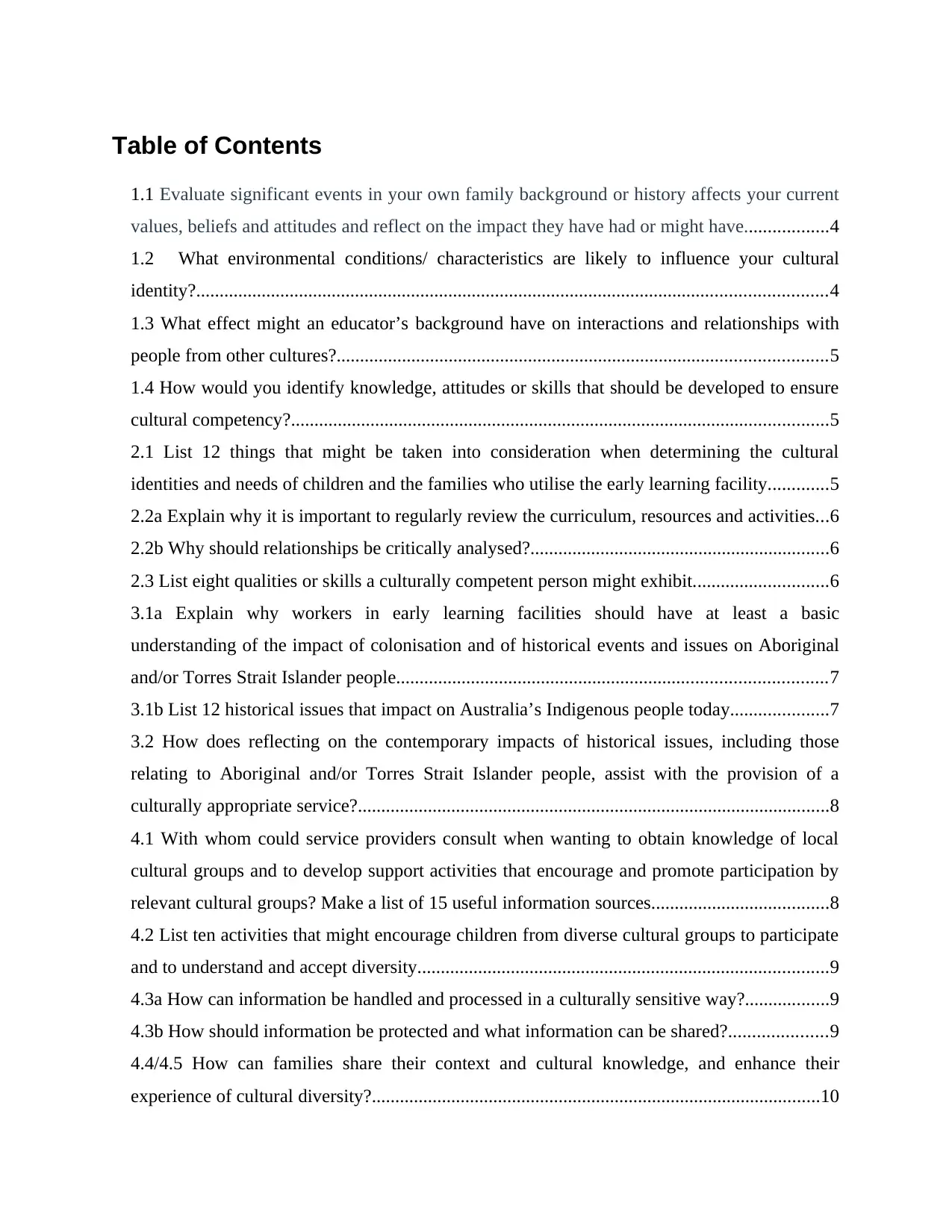
Table of Contents
1.1 Evaluate significant events in your own family background or history affects your current
values, beliefs and attitudes and reflect on the impact they have had or might have..................4
1.2 What environmental conditions/ characteristics are likely to influence your cultural
identity?.......................................................................................................................................4
1.3 What effect might an educator’s background have on interactions and relationships with
people from other cultures?.........................................................................................................5
1.4 How would you identify knowledge, attitudes or skills that should be developed to ensure
cultural competency?...................................................................................................................5
2.1 List 12 things that might be taken into consideration when determining the cultural
identities and needs of children and the families who utilise the early learning facility.............5
2.2a Explain why it is important to regularly review the curriculum, resources and activities...6
2.2b Why should relationships be critically analysed?................................................................6
2.3 List eight qualities or skills a culturally competent person might exhibit.............................6
3.1a Explain why workers in early learning facilities should have at least a basic
understanding of the impact of colonisation and of historical events and issues on Aboriginal
and/or Torres Strait Islander people............................................................................................7
3.1b List 12 historical issues that impact on Australia’s Indigenous people today.....................7
3.2 How does reflecting on the contemporary impacts of historical issues, including those
relating to Aboriginal and/or Torres Strait Islander people, assist with the provision of a
culturally appropriate service?.....................................................................................................8
4.1 With whom could service providers consult when wanting to obtain knowledge of local
cultural groups and to develop support activities that encourage and promote participation by
relevant cultural groups? Make a list of 15 useful information sources......................................8
4.2 List ten activities that might encourage children from diverse cultural groups to participate
and to understand and accept diversity........................................................................................9
4.3a How can information be handled and processed in a culturally sensitive way?..................9
4.3b How should information be protected and what information can be shared?.....................9
4.4/4.5 How can families share their context and cultural knowledge, and enhance their
experience of cultural diversity?................................................................................................10
1.1 Evaluate significant events in your own family background or history affects your current
values, beliefs and attitudes and reflect on the impact they have had or might have..................4
1.2 What environmental conditions/ characteristics are likely to influence your cultural
identity?.......................................................................................................................................4
1.3 What effect might an educator’s background have on interactions and relationships with
people from other cultures?.........................................................................................................5
1.4 How would you identify knowledge, attitudes or skills that should be developed to ensure
cultural competency?...................................................................................................................5
2.1 List 12 things that might be taken into consideration when determining the cultural
identities and needs of children and the families who utilise the early learning facility.............5
2.2a Explain why it is important to regularly review the curriculum, resources and activities...6
2.2b Why should relationships be critically analysed?................................................................6
2.3 List eight qualities or skills a culturally competent person might exhibit.............................6
3.1a Explain why workers in early learning facilities should have at least a basic
understanding of the impact of colonisation and of historical events and issues on Aboriginal
and/or Torres Strait Islander people............................................................................................7
3.1b List 12 historical issues that impact on Australia’s Indigenous people today.....................7
3.2 How does reflecting on the contemporary impacts of historical issues, including those
relating to Aboriginal and/or Torres Strait Islander people, assist with the provision of a
culturally appropriate service?.....................................................................................................8
4.1 With whom could service providers consult when wanting to obtain knowledge of local
cultural groups and to develop support activities that encourage and promote participation by
relevant cultural groups? Make a list of 15 useful information sources......................................8
4.2 List ten activities that might encourage children from diverse cultural groups to participate
and to understand and accept diversity........................................................................................9
4.3a How can information be handled and processed in a culturally sensitive way?..................9
4.3b How should information be protected and what information can be shared?.....................9
4.4/4.5 How can families share their context and cultural knowledge, and enhance their
experience of cultural diversity?................................................................................................10
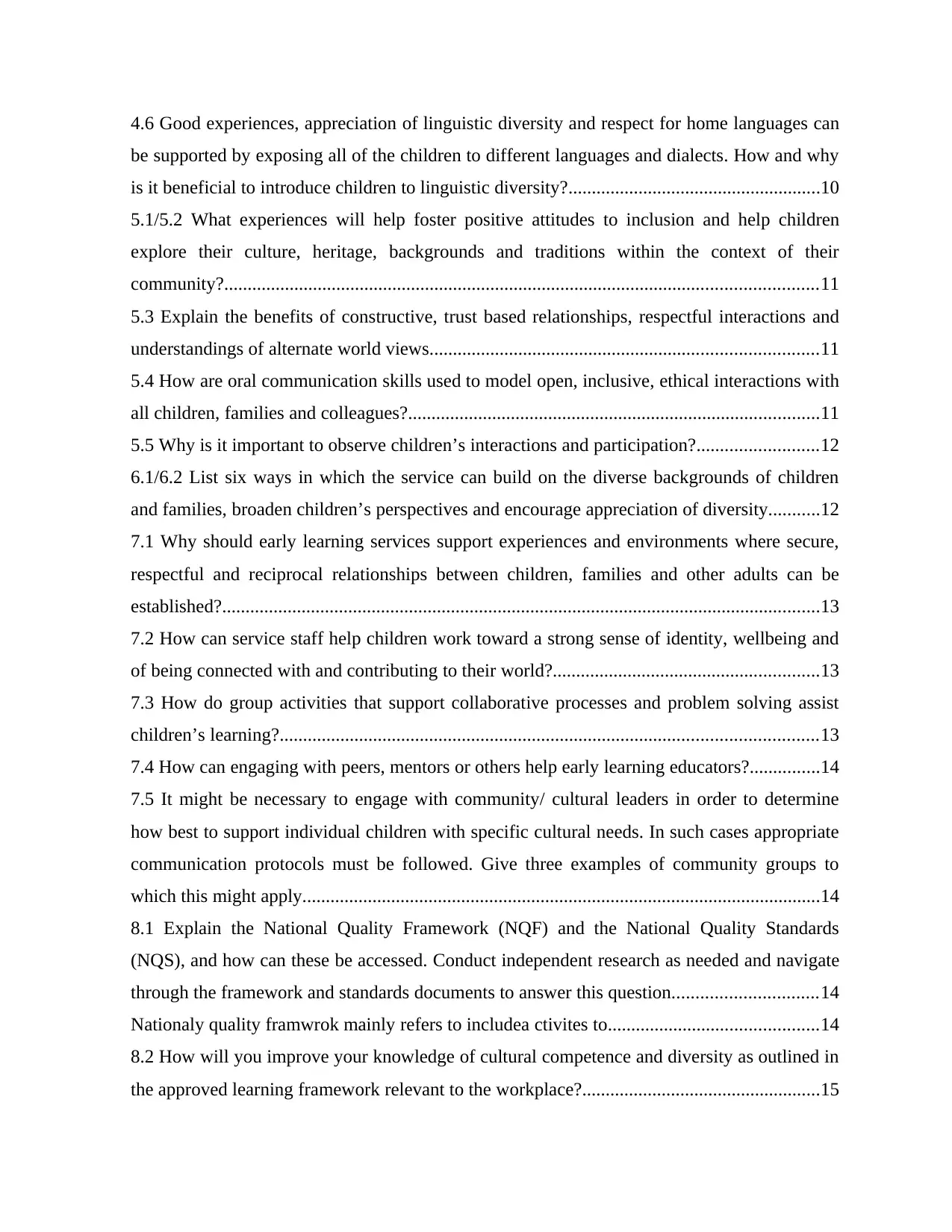
4.6 Good experiences, appreciation of linguistic diversity and respect for home languages can
be supported by exposing all of the children to different languages and dialects. How and why
is it beneficial to introduce children to linguistic diversity?......................................................10
5.1/5.2 What experiences will help foster positive attitudes to inclusion and help children
explore their culture, heritage, backgrounds and traditions within the context of their
community?...............................................................................................................................11
5.3 Explain the benefits of constructive, trust based relationships, respectful interactions and
understandings of alternate world views...................................................................................11
5.4 How are oral communication skills used to model open, inclusive, ethical interactions with
all children, families and colleagues?........................................................................................11
5.5 Why is it important to observe children’s interactions and participation?..........................12
6.1/6.2 List six ways in which the service can build on the diverse backgrounds of children
and families, broaden children’s perspectives and encourage appreciation of diversity...........12
7.1 Why should early learning services support experiences and environments where secure,
respectful and reciprocal relationships between children, families and other adults can be
established?................................................................................................................................13
7.2 How can service staff help children work toward a strong sense of identity, wellbeing and
of being connected with and contributing to their world?.........................................................13
7.3 How do group activities that support collaborative processes and problem solving assist
children’s learning?...................................................................................................................13
7.4 How can engaging with peers, mentors or others help early learning educators?...............14
7.5 It might be necessary to engage with community/ cultural leaders in order to determine
how best to support individual children with specific cultural needs. In such cases appropriate
communication protocols must be followed. Give three examples of community groups to
which this might apply...............................................................................................................14
8.1 Explain the National Quality Framework (NQF) and the National Quality Standards
(NQS), and how can these be accessed. Conduct independent research as needed and navigate
through the framework and standards documents to answer this question...............................14
Nationaly quality framwrok mainly refers to includea ctivites to.............................................14
8.2 How will you improve your knowledge of cultural competence and diversity as outlined in
the approved learning framework relevant to the workplace?...................................................15
be supported by exposing all of the children to different languages and dialects. How and why
is it beneficial to introduce children to linguistic diversity?......................................................10
5.1/5.2 What experiences will help foster positive attitudes to inclusion and help children
explore their culture, heritage, backgrounds and traditions within the context of their
community?...............................................................................................................................11
5.3 Explain the benefits of constructive, trust based relationships, respectful interactions and
understandings of alternate world views...................................................................................11
5.4 How are oral communication skills used to model open, inclusive, ethical interactions with
all children, families and colleagues?........................................................................................11
5.5 Why is it important to observe children’s interactions and participation?..........................12
6.1/6.2 List six ways in which the service can build on the diverse backgrounds of children
and families, broaden children’s perspectives and encourage appreciation of diversity...........12
7.1 Why should early learning services support experiences and environments where secure,
respectful and reciprocal relationships between children, families and other adults can be
established?................................................................................................................................13
7.2 How can service staff help children work toward a strong sense of identity, wellbeing and
of being connected with and contributing to their world?.........................................................13
7.3 How do group activities that support collaborative processes and problem solving assist
children’s learning?...................................................................................................................13
7.4 How can engaging with peers, mentors or others help early learning educators?...............14
7.5 It might be necessary to engage with community/ cultural leaders in order to determine
how best to support individual children with specific cultural needs. In such cases appropriate
communication protocols must be followed. Give three examples of community groups to
which this might apply...............................................................................................................14
8.1 Explain the National Quality Framework (NQF) and the National Quality Standards
(NQS), and how can these be accessed. Conduct independent research as needed and navigate
through the framework and standards documents to answer this question...............................14
Nationaly quality framwrok mainly refers to includea ctivites to.............................................14
8.2 How will you improve your knowledge of cultural competence and diversity as outlined in
the approved learning framework relevant to the workplace?...................................................15
⊘ This is a preview!⊘
Do you want full access?
Subscribe today to unlock all pages.

Trusted by 1+ million students worldwide
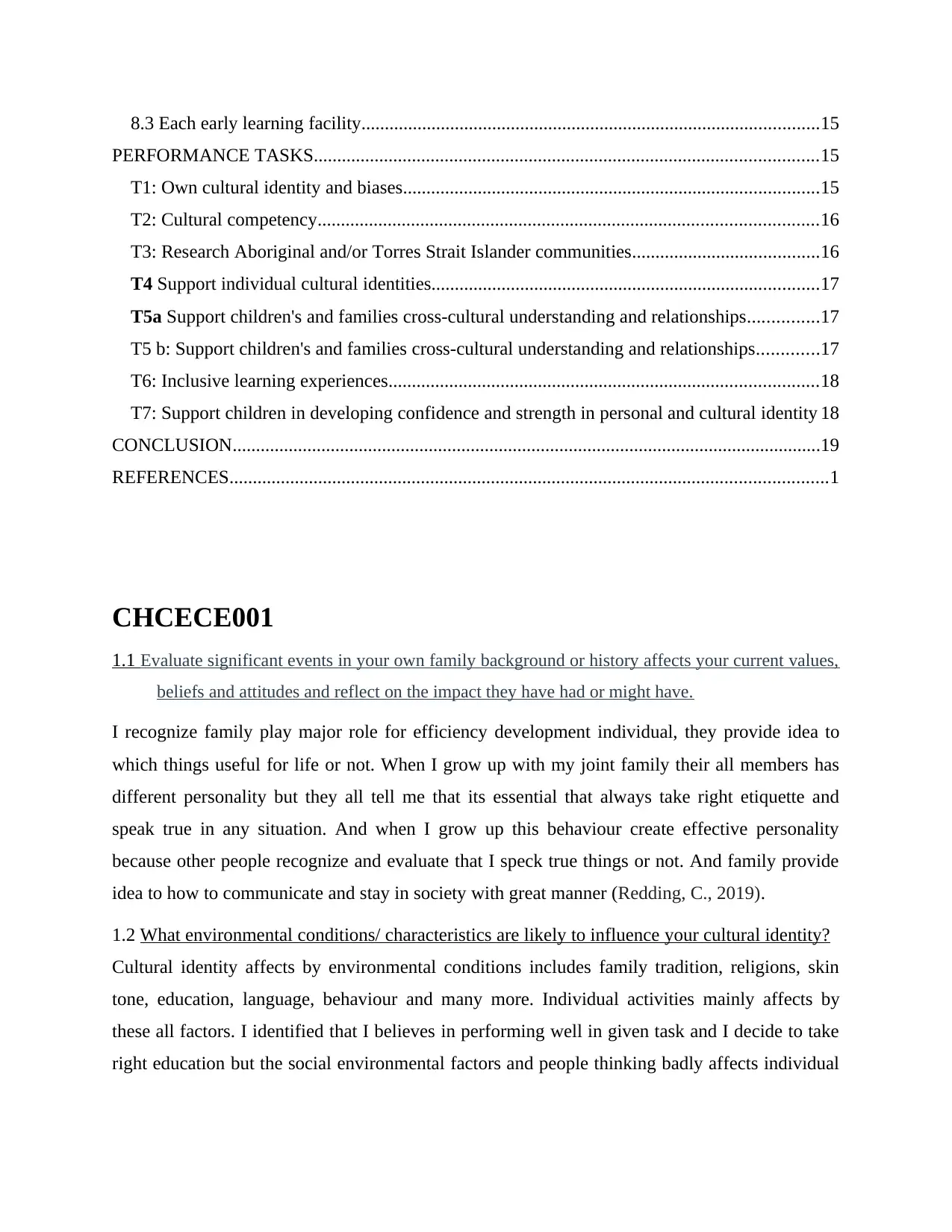
8.3 Each early learning facility..................................................................................................15
PERFORMANCE TASKS............................................................................................................15
T1: Own cultural identity and biases.........................................................................................15
T2: Cultural competency...........................................................................................................16
T3: Research Aboriginal and/or Torres Strait Islander communities........................................16
T4 Support individual cultural identities...................................................................................17
T5a Support children's and families cross-cultural understanding and relationships...............17
T5 b: Support children's and families cross-cultural understanding and relationships.............17
T6: Inclusive learning experiences............................................................................................18
T7: Support children in developing confidence and strength in personal and cultural identity 18
CONCLUSION..............................................................................................................................19
REFERENCES................................................................................................................................1
CHCECE001
1.1 Evaluate significant events in your own family background or history affects your current values,
beliefs and attitudes and reflect on the impact they have had or might have.
I recognize family play major role for efficiency development individual, they provide idea to
which things useful for life or not. When I grow up with my joint family their all members has
different personality but they all tell me that its essential that always take right etiquette and
speak true in any situation. And when I grow up this behaviour create effective personality
because other people recognize and evaluate that I speck true things or not. And family provide
idea to how to communicate and stay in society with great manner (Redding, C., 2019).
1.2 What environmental conditions/ characteristics are likely to influence your cultural identity?
Cultural identity affects by environmental conditions includes family tradition, religions, skin
tone, education, language, behaviour and many more. Individual activities mainly affects by
these all factors. I identified that I believes in performing well in given task and I decide to take
right education but the social environmental factors and people thinking badly affects individual
PERFORMANCE TASKS............................................................................................................15
T1: Own cultural identity and biases.........................................................................................15
T2: Cultural competency...........................................................................................................16
T3: Research Aboriginal and/or Torres Strait Islander communities........................................16
T4 Support individual cultural identities...................................................................................17
T5a Support children's and families cross-cultural understanding and relationships...............17
T5 b: Support children's and families cross-cultural understanding and relationships.............17
T6: Inclusive learning experiences............................................................................................18
T7: Support children in developing confidence and strength in personal and cultural identity 18
CONCLUSION..............................................................................................................................19
REFERENCES................................................................................................................................1
CHCECE001
1.1 Evaluate significant events in your own family background or history affects your current values,
beliefs and attitudes and reflect on the impact they have had or might have.
I recognize family play major role for efficiency development individual, they provide idea to
which things useful for life or not. When I grow up with my joint family their all members has
different personality but they all tell me that its essential that always take right etiquette and
speak true in any situation. And when I grow up this behaviour create effective personality
because other people recognize and evaluate that I speck true things or not. And family provide
idea to how to communicate and stay in society with great manner (Redding, C., 2019).
1.2 What environmental conditions/ characteristics are likely to influence your cultural identity?
Cultural identity affects by environmental conditions includes family tradition, religions, skin
tone, education, language, behaviour and many more. Individual activities mainly affects by
these all factors. I identified that I believes in performing well in given task and I decide to take
right education but the social environmental factors and people thinking badly affects individual
Paraphrase This Document
Need a fresh take? Get an instant paraphrase of this document with our AI Paraphraser

personality. Family has responsibility to provide information to children to develop them better
understating and provide them information about cultural activities so they evaluate right things
1.3 What effect might an educator’s background have on interactions and relationships with
people from other cultures?
Educators provide best sustainable cultural and provide information to
maintain good relationship with every individual, so they helps to develop better
understanding and provide information to students about every culture are
same and its not good thing that individual develop comparison and
communicate on the basis of their social background. So from the idea about
this term teacher play effective roles for effective society development. They
provide guidance to children and motivated them to maintain good relation with
individual. Also they develop awareness about friendship development, maintain
good and positive relation with different culture and background people.
1.4 How would you identify knowledge, attitudes or skills that should be developed to ensure
cultural competency?
Self awareness development about different cultural activities, identification and their
beliefs, values from their performance, communicate with and identify their perspective about
different people and many more. Its easier to evaluate different cultural activities near to by
society people and their different religion but the major thing is to individual has to develop
practices to communicate and not showing attitude on the basis of their background and their
lifestyles. So individual can easily find and develop self awareness from their near society people
behaviours and believes.
2.1 List 12 things that might be taken into consideration when determining the cultural identities
and needs of children and the families who utilise the early learning facility.
Society values and believes
Gender
Language
Religion
understating and provide them information about cultural activities so they evaluate right things
1.3 What effect might an educator’s background have on interactions and relationships with
people from other cultures?
Educators provide best sustainable cultural and provide information to
maintain good relationship with every individual, so they helps to develop better
understanding and provide information to students about every culture are
same and its not good thing that individual develop comparison and
communicate on the basis of their social background. So from the idea about
this term teacher play effective roles for effective society development. They
provide guidance to children and motivated them to maintain good relation with
individual. Also they develop awareness about friendship development, maintain
good and positive relation with different culture and background people.
1.4 How would you identify knowledge, attitudes or skills that should be developed to ensure
cultural competency?
Self awareness development about different cultural activities, identification and their
beliefs, values from their performance, communicate with and identify their perspective about
different people and many more. Its easier to evaluate different cultural activities near to by
society people and their different religion but the major thing is to individual has to develop
practices to communicate and not showing attitude on the basis of their background and their
lifestyles. So individual can easily find and develop self awareness from their near society people
behaviours and believes.
2.1 List 12 things that might be taken into consideration when determining the cultural identities
and needs of children and the families who utilise the early learning facility.
Society values and believes
Gender
Language
Religion
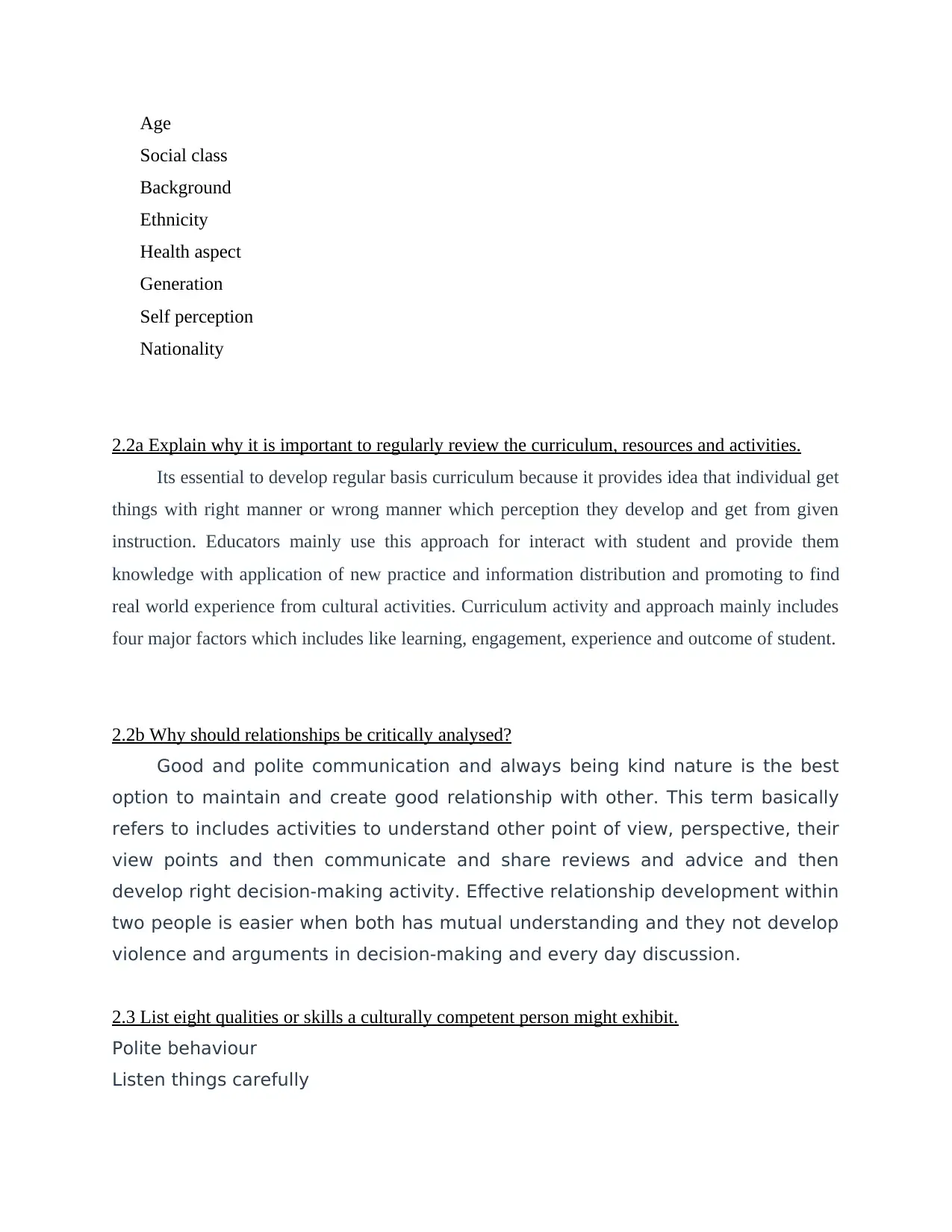
Age
Social class
Background
Ethnicity
Health aspect
Generation
Self perception
Nationality
2.2a Explain why it is important to regularly review the curriculum, resources and activities.
Its essential to develop regular basis curriculum because it provides idea that individual get
things with right manner or wrong manner which perception they develop and get from given
instruction. Educators mainly use this approach for interact with student and provide them
knowledge with application of new practice and information distribution and promoting to find
real world experience from cultural activities. Curriculum activity and approach mainly includes
four major factors which includes like learning, engagement, experience and outcome of student.
2.2b Why should relationships be critically analysed?
Good and polite communication and always being kind nature is the best
option to maintain and create good relationship with other. This term basically
refers to includes activities to understand other point of view, perspective, their
view points and then communicate and share reviews and advice and then
develop right decision-making activity. Effective relationship development within
two people is easier when both has mutual understanding and they not develop
violence and arguments in decision-making and every day discussion.
2.3 List eight qualities or skills a culturally competent person might exhibit.
Polite behaviour
Listen things carefully
Social class
Background
Ethnicity
Health aspect
Generation
Self perception
Nationality
2.2a Explain why it is important to regularly review the curriculum, resources and activities.
Its essential to develop regular basis curriculum because it provides idea that individual get
things with right manner or wrong manner which perception they develop and get from given
instruction. Educators mainly use this approach for interact with student and provide them
knowledge with application of new practice and information distribution and promoting to find
real world experience from cultural activities. Curriculum activity and approach mainly includes
four major factors which includes like learning, engagement, experience and outcome of student.
2.2b Why should relationships be critically analysed?
Good and polite communication and always being kind nature is the best
option to maintain and create good relationship with other. This term basically
refers to includes activities to understand other point of view, perspective, their
view points and then communicate and share reviews and advice and then
develop right decision-making activity. Effective relationship development within
two people is easier when both has mutual understanding and they not develop
violence and arguments in decision-making and every day discussion.
2.3 List eight qualities or skills a culturally competent person might exhibit.
Polite behaviour
Listen things carefully
⊘ This is a preview!⊘
Do you want full access?
Subscribe today to unlock all pages.

Trusted by 1+ million students worldwide
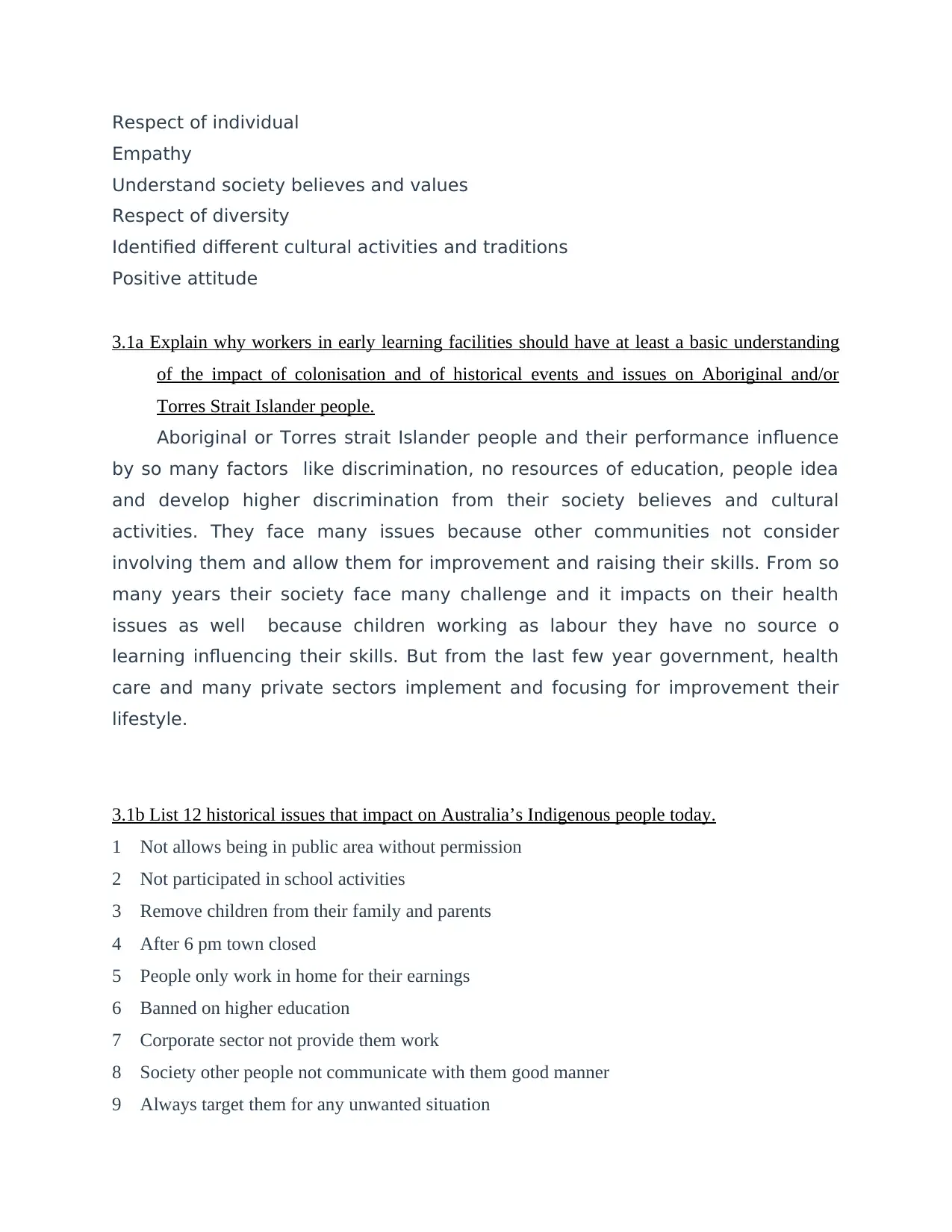
Respect of individual
Empathy
Understand society believes and values
Respect of diversity
Identified different cultural activities and traditions
Positive attitude
3.1a Explain why workers in early learning facilities should have at least a basic understanding
of the impact of colonisation and of historical events and issues on Aboriginal and/or
Torres Strait Islander people.
Aboriginal or Torres strait Islander people and their performance influence
by so many factors like discrimination, no resources of education, people idea
and develop higher discrimination from their society believes and cultural
activities. They face many issues because other communities not consider
involving them and allow them for improvement and raising their skills. From so
many years their society face many challenge and it impacts on their health
issues as well because children working as labour they have no source o
learning influencing their skills. But from the last few year government, health
care and many private sectors implement and focusing for improvement their
lifestyle.
3.1b List 12 historical issues that impact on Australia’s Indigenous people today.
1 Not allows being in public area without permission
2 Not participated in school activities
3 Remove children from their family and parents
4 After 6 pm town closed
5 People only work in home for their earnings
6 Banned on higher education
7 Corporate sector not provide them work
8 Society other people not communicate with them good manner
9 Always target them for any unwanted situation
Empathy
Understand society believes and values
Respect of diversity
Identified different cultural activities and traditions
Positive attitude
3.1a Explain why workers in early learning facilities should have at least a basic understanding
of the impact of colonisation and of historical events and issues on Aboriginal and/or
Torres Strait Islander people.
Aboriginal or Torres strait Islander people and their performance influence
by so many factors like discrimination, no resources of education, people idea
and develop higher discrimination from their society believes and cultural
activities. They face many issues because other communities not consider
involving them and allow them for improvement and raising their skills. From so
many years their society face many challenge and it impacts on their health
issues as well because children working as labour they have no source o
learning influencing their skills. But from the last few year government, health
care and many private sectors implement and focusing for improvement their
lifestyle.
3.1b List 12 historical issues that impact on Australia’s Indigenous people today.
1 Not allows being in public area without permission
2 Not participated in school activities
3 Remove children from their family and parents
4 After 6 pm town closed
5 People only work in home for their earnings
6 Banned on higher education
7 Corporate sector not provide them work
8 Society other people not communicate with them good manner
9 Always target them for any unwanted situation
Paraphrase This Document
Need a fresh take? Get an instant paraphrase of this document with our AI Paraphraser
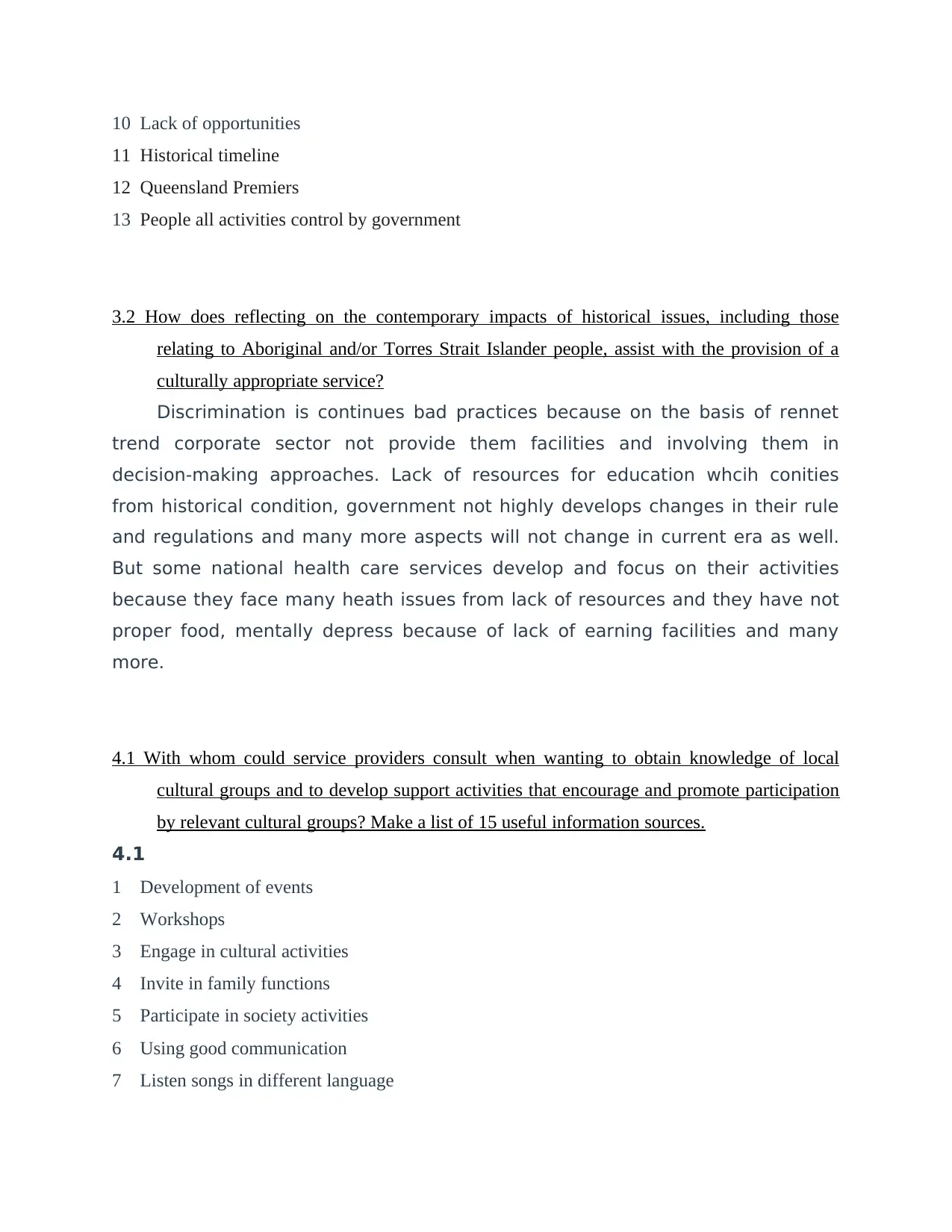
10 Lack of opportunities
11 Historical timeline
12 Queensland Premiers
13 People all activities control by government
3.2 How does reflecting on the contemporary impacts of historical issues, including those
relating to Aboriginal and/or Torres Strait Islander people, assist with the provision of a
culturally appropriate service?
Discrimination is continues bad practices because on the basis of rennet
trend corporate sector not provide them facilities and involving them in
decision-making approaches. Lack of resources for education whcih conities
from historical condition, government not highly develops changes in their rule
and regulations and many more aspects will not change in current era as well.
But some national health care services develop and focus on their activities
because they face many heath issues from lack of resources and they have not
proper food, mentally depress because of lack of earning facilities and many
more.
4.1 With whom could service providers consult when wanting to obtain knowledge of local
cultural groups and to develop support activities that encourage and promote participation
by relevant cultural groups? Make a list of 15 useful information sources.
4.1
1 Development of events
2 Workshops
3 Engage in cultural activities
4 Invite in family functions
5 Participate in society activities
6 Using good communication
7 Listen songs in different language
11 Historical timeline
12 Queensland Premiers
13 People all activities control by government
3.2 How does reflecting on the contemporary impacts of historical issues, including those
relating to Aboriginal and/or Torres Strait Islander people, assist with the provision of a
culturally appropriate service?
Discrimination is continues bad practices because on the basis of rennet
trend corporate sector not provide them facilities and involving them in
decision-making approaches. Lack of resources for education whcih conities
from historical condition, government not highly develops changes in their rule
and regulations and many more aspects will not change in current era as well.
But some national health care services develop and focus on their activities
because they face many heath issues from lack of resources and they have not
proper food, mentally depress because of lack of earning facilities and many
more.
4.1 With whom could service providers consult when wanting to obtain knowledge of local
cultural groups and to develop support activities that encourage and promote participation
by relevant cultural groups? Make a list of 15 useful information sources.
4.1
1 Development of events
2 Workshops
3 Engage in cultural activities
4 Invite in family functions
5 Participate in society activities
6 Using good communication
7 Listen songs in different language
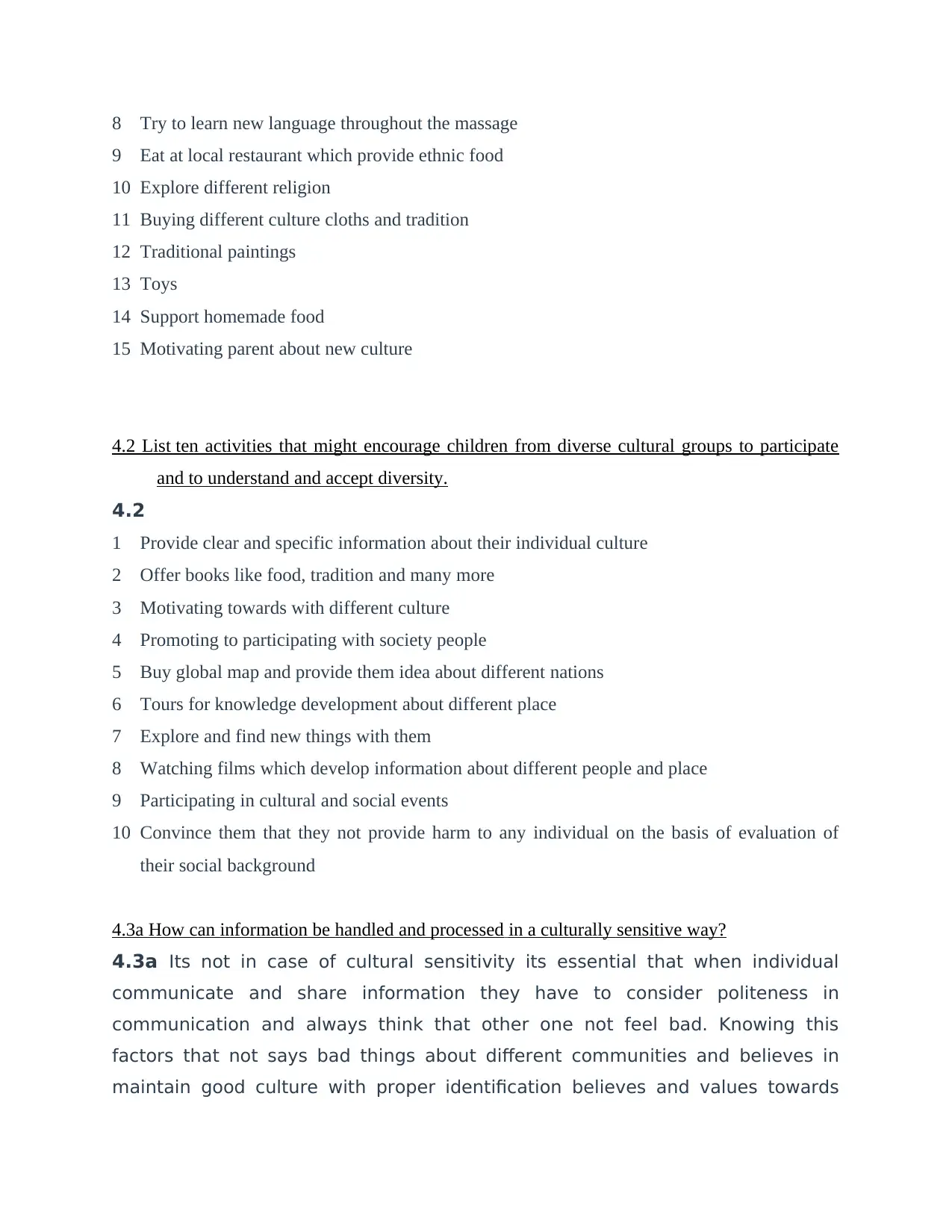
8 Try to learn new language throughout the massage
9 Eat at local restaurant which provide ethnic food
10 Explore different religion
11 Buying different culture cloths and tradition
12 Traditional paintings
13 Toys
14 Support homemade food
15 Motivating parent about new culture
4.2 List ten activities that might encourage children from diverse cultural groups to participate
and to understand and accept diversity.
4.2
1 Provide clear and specific information about their individual culture
2 Offer books like food, tradition and many more
3 Motivating towards with different culture
4 Promoting to participating with society people
5 Buy global map and provide them idea about different nations
6 Tours for knowledge development about different place
7 Explore and find new things with them
8 Watching films which develop information about different people and place
9 Participating in cultural and social events
10 Convince them that they not provide harm to any individual on the basis of evaluation of
their social background
4.3a How can information be handled and processed in a culturally sensitive way?
4.3a Its not in case of cultural sensitivity its essential that when individual
communicate and share information they have to consider politeness in
communication and always think that other one not feel bad. Knowing this
factors that not says bad things about different communities and believes in
maintain good culture with proper identification believes and values towards
9 Eat at local restaurant which provide ethnic food
10 Explore different religion
11 Buying different culture cloths and tradition
12 Traditional paintings
13 Toys
14 Support homemade food
15 Motivating parent about new culture
4.2 List ten activities that might encourage children from diverse cultural groups to participate
and to understand and accept diversity.
4.2
1 Provide clear and specific information about their individual culture
2 Offer books like food, tradition and many more
3 Motivating towards with different culture
4 Promoting to participating with society people
5 Buy global map and provide them idea about different nations
6 Tours for knowledge development about different place
7 Explore and find new things with them
8 Watching films which develop information about different people and place
9 Participating in cultural and social events
10 Convince them that they not provide harm to any individual on the basis of evaluation of
their social background
4.3a How can information be handled and processed in a culturally sensitive way?
4.3a Its not in case of cultural sensitivity its essential that when individual
communicate and share information they have to consider politeness in
communication and always think that other one not feel bad. Knowing this
factors that not says bad things about different communities and believes in
maintain good culture with proper identification believes and values towards
⊘ This is a preview!⊘
Do you want full access?
Subscribe today to unlock all pages.

Trusted by 1+ million students worldwide
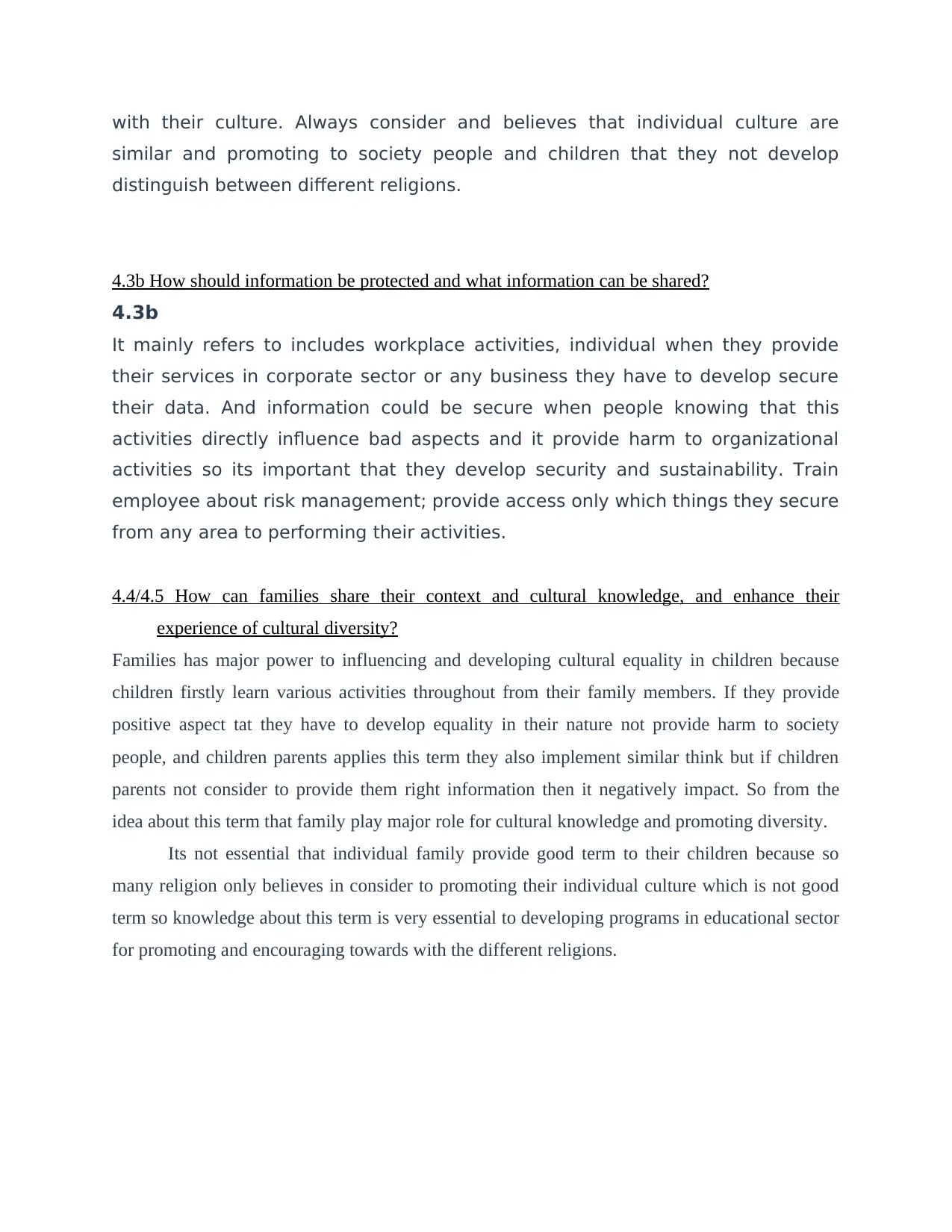
with their culture. Always consider and believes that individual culture are
similar and promoting to society people and children that they not develop
distinguish between different religions.
4.3b How should information be protected and what information can be shared?
4.3b
It mainly refers to includes workplace activities, individual when they provide
their services in corporate sector or any business they have to develop secure
their data. And information could be secure when people knowing that this
activities directly influence bad aspects and it provide harm to organizational
activities so its important that they develop security and sustainability. Train
employee about risk management; provide access only which things they secure
from any area to performing their activities.
4.4/4.5 How can families share their context and cultural knowledge, and enhance their
experience of cultural diversity?
Families has major power to influencing and developing cultural equality in children because
children firstly learn various activities throughout from their family members. If they provide
positive aspect tat they have to develop equality in their nature not provide harm to society
people, and children parents applies this term they also implement similar think but if children
parents not consider to provide them right information then it negatively impact. So from the
idea about this term that family play major role for cultural knowledge and promoting diversity.
Its not essential that individual family provide good term to their children because so
many religion only believes in consider to promoting their individual culture which is not good
term so knowledge about this term is very essential to developing programs in educational sector
for promoting and encouraging towards with the different religions.
similar and promoting to society people and children that they not develop
distinguish between different religions.
4.3b How should information be protected and what information can be shared?
4.3b
It mainly refers to includes workplace activities, individual when they provide
their services in corporate sector or any business they have to develop secure
their data. And information could be secure when people knowing that this
activities directly influence bad aspects and it provide harm to organizational
activities so its important that they develop security and sustainability. Train
employee about risk management; provide access only which things they secure
from any area to performing their activities.
4.4/4.5 How can families share their context and cultural knowledge, and enhance their
experience of cultural diversity?
Families has major power to influencing and developing cultural equality in children because
children firstly learn various activities throughout from their family members. If they provide
positive aspect tat they have to develop equality in their nature not provide harm to society
people, and children parents applies this term they also implement similar think but if children
parents not consider to provide them right information then it negatively impact. So from the
idea about this term that family play major role for cultural knowledge and promoting diversity.
Its not essential that individual family provide good term to their children because so
many religion only believes in consider to promoting their individual culture which is not good
term so knowledge about this term is very essential to developing programs in educational sector
for promoting and encouraging towards with the different religions.
Paraphrase This Document
Need a fresh take? Get an instant paraphrase of this document with our AI Paraphraser
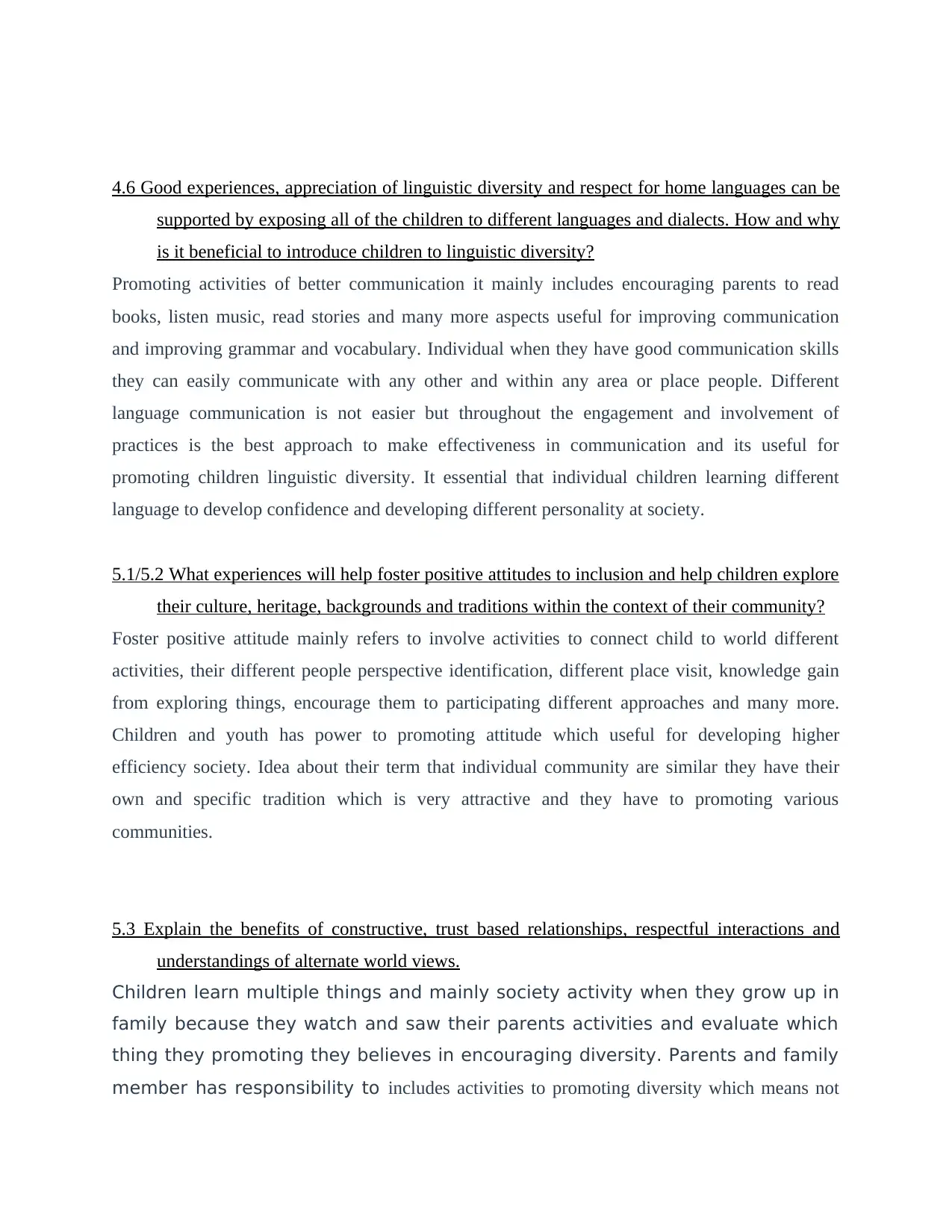
4.6 Good experiences, appreciation of linguistic diversity and respect for home languages can be
supported by exposing all of the children to different languages and dialects. How and why
is it beneficial to introduce children to linguistic diversity?
Promoting activities of better communication it mainly includes encouraging parents to read
books, listen music, read stories and many more aspects useful for improving communication
and improving grammar and vocabulary. Individual when they have good communication skills
they can easily communicate with any other and within any area or place people. Different
language communication is not easier but throughout the engagement and involvement of
practices is the best approach to make effectiveness in communication and its useful for
promoting children linguistic diversity. It essential that individual children learning different
language to develop confidence and developing different personality at society.
5.1/5.2 What experiences will help foster positive attitudes to inclusion and help children explore
their culture, heritage, backgrounds and traditions within the context of their community?
Foster positive attitude mainly refers to involve activities to connect child to world different
activities, their different people perspective identification, different place visit, knowledge gain
from exploring things, encourage them to participating different approaches and many more.
Children and youth has power to promoting attitude which useful for developing higher
efficiency society. Idea about their term that individual community are similar they have their
own and specific tradition which is very attractive and they have to promoting various
communities.
5.3 Explain the benefits of constructive, trust based relationships, respectful interactions and
understandings of alternate world views.
Children learn multiple things and mainly society activity when they grow up in
family because they watch and saw their parents activities and evaluate which
thing they promoting they believes in encouraging diversity. Parents and family
member has responsibility to includes activities to promoting diversity which means not
supported by exposing all of the children to different languages and dialects. How and why
is it beneficial to introduce children to linguistic diversity?
Promoting activities of better communication it mainly includes encouraging parents to read
books, listen music, read stories and many more aspects useful for improving communication
and improving grammar and vocabulary. Individual when they have good communication skills
they can easily communicate with any other and within any area or place people. Different
language communication is not easier but throughout the engagement and involvement of
practices is the best approach to make effectiveness in communication and its useful for
promoting children linguistic diversity. It essential that individual children learning different
language to develop confidence and developing different personality at society.
5.1/5.2 What experiences will help foster positive attitudes to inclusion and help children explore
their culture, heritage, backgrounds and traditions within the context of their community?
Foster positive attitude mainly refers to involve activities to connect child to world different
activities, their different people perspective identification, different place visit, knowledge gain
from exploring things, encourage them to participating different approaches and many more.
Children and youth has power to promoting attitude which useful for developing higher
efficiency society. Idea about their term that individual community are similar they have their
own and specific tradition which is very attractive and they have to promoting various
communities.
5.3 Explain the benefits of constructive, trust based relationships, respectful interactions and
understandings of alternate world views.
Children learn multiple things and mainly society activity when they grow up in
family because they watch and saw their parents activities and evaluate which
thing they promoting they believes in encouraging diversity. Parents and family
member has responsibility to includes activities to promoting diversity which means not
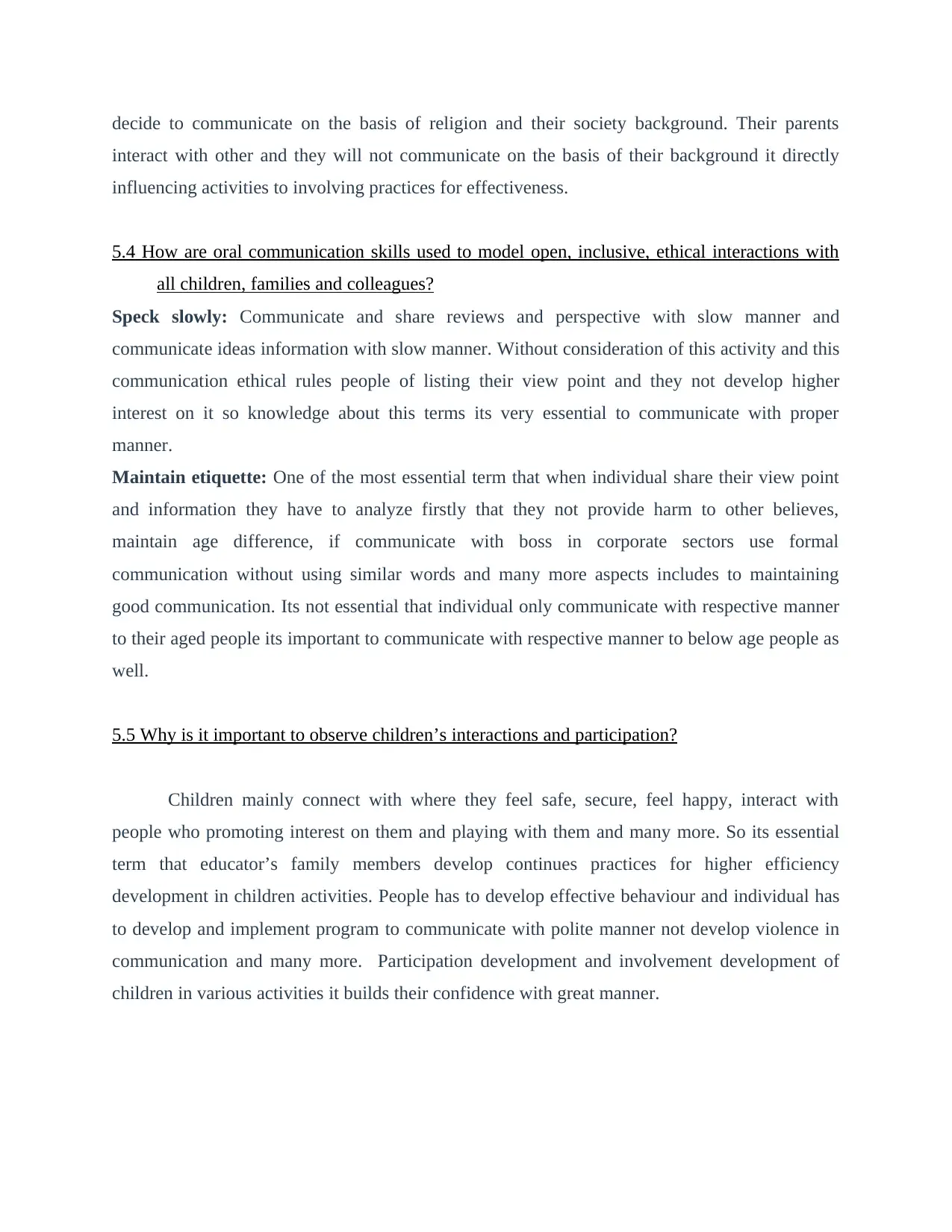
decide to communicate on the basis of religion and their society background. Their parents
interact with other and they will not communicate on the basis of their background it directly
influencing activities to involving practices for effectiveness.
5.4 How are oral communication skills used to model open, inclusive, ethical interactions with
all children, families and colleagues?
Speck slowly: Communicate and share reviews and perspective with slow manner and
communicate ideas information with slow manner. Without consideration of this activity and this
communication ethical rules people of listing their view point and they not develop higher
interest on it so knowledge about this terms its very essential to communicate with proper
manner.
Maintain etiquette: One of the most essential term that when individual share their view point
and information they have to analyze firstly that they not provide harm to other believes,
maintain age difference, if communicate with boss in corporate sectors use formal
communication without using similar words and many more aspects includes to maintaining
good communication. Its not essential that individual only communicate with respective manner
to their aged people its important to communicate with respective manner to below age people as
well.
5.5 Why is it important to observe children’s interactions and participation?
Children mainly connect with where they feel safe, secure, feel happy, interact with
people who promoting interest on them and playing with them and many more. So its essential
term that educator’s family members develop continues practices for higher efficiency
development in children activities. People has to develop effective behaviour and individual has
to develop and implement program to communicate with polite manner not develop violence in
communication and many more. Participation development and involvement development of
children in various activities it builds their confidence with great manner.
interact with other and they will not communicate on the basis of their background it directly
influencing activities to involving practices for effectiveness.
5.4 How are oral communication skills used to model open, inclusive, ethical interactions with
all children, families and colleagues?
Speck slowly: Communicate and share reviews and perspective with slow manner and
communicate ideas information with slow manner. Without consideration of this activity and this
communication ethical rules people of listing their view point and they not develop higher
interest on it so knowledge about this terms its very essential to communicate with proper
manner.
Maintain etiquette: One of the most essential term that when individual share their view point
and information they have to analyze firstly that they not provide harm to other believes,
maintain age difference, if communicate with boss in corporate sectors use formal
communication without using similar words and many more aspects includes to maintaining
good communication. Its not essential that individual only communicate with respective manner
to their aged people its important to communicate with respective manner to below age people as
well.
5.5 Why is it important to observe children’s interactions and participation?
Children mainly connect with where they feel safe, secure, feel happy, interact with
people who promoting interest on them and playing with them and many more. So its essential
term that educator’s family members develop continues practices for higher efficiency
development in children activities. People has to develop effective behaviour and individual has
to develop and implement program to communicate with polite manner not develop violence in
communication and many more. Participation development and involvement development of
children in various activities it builds their confidence with great manner.
⊘ This is a preview!⊘
Do you want full access?
Subscribe today to unlock all pages.

Trusted by 1+ million students worldwide
1 out of 22
Related Documents
Your All-in-One AI-Powered Toolkit for Academic Success.
+13062052269
info@desklib.com
Available 24*7 on WhatsApp / Email
![[object Object]](/_next/static/media/star-bottom.7253800d.svg)
Unlock your academic potential
Copyright © 2020–2026 A2Z Services. All Rights Reserved. Developed and managed by ZUCOL.





